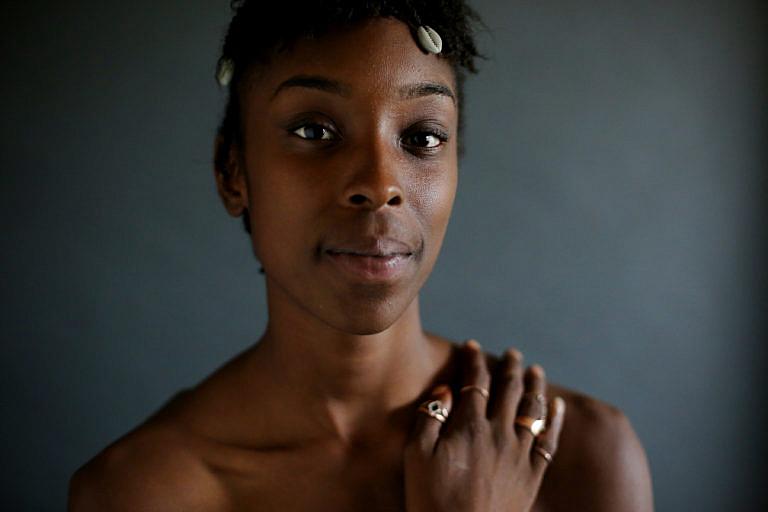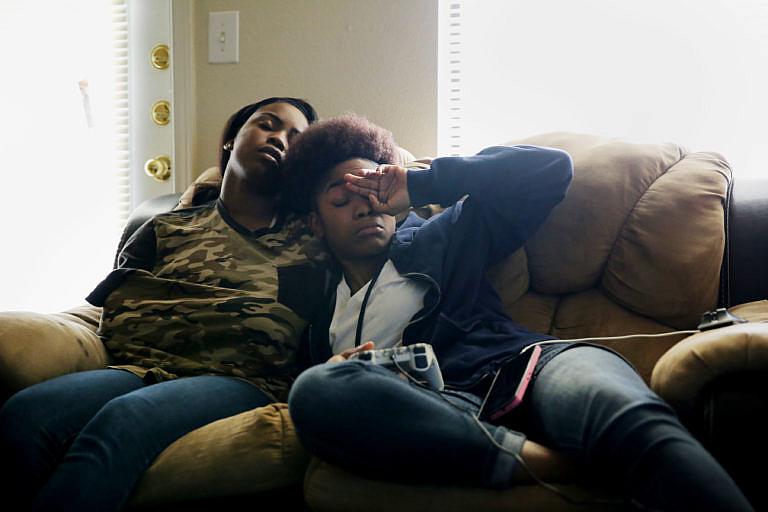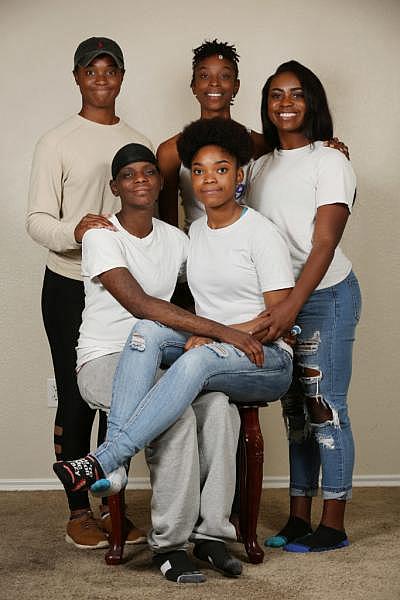Mom is in jail: What happens to her kids?
Cary Aspinwall, former creative director at The Frontier, recently published an investigation into what happens to children when their moms go to jail. The project began while she was working in Oklahoma for The Frontier and received a grant to assist with the reporting from the Fund for Child Well-Being, a program of the University of Southern California Center for Health Journalism. Here, she’s sharing the story of how she learned about this issue and how Tulsa has two unique programs aimed at addressing this issue in Oklahoma.
Other stories in the series include:
Overlooked: As women go to jail in record numbers, who's watching out for their kids? No one.

For the Booker sisters, whenever Malishia Booker, their mother, went to jail, it seemed as though they were also being punished. Throughout their lives, they endured foster care, bouncing between relatives and toughing it out on their own. Critics say children of jailed women often get lost in a criminal justice system that doesn’t count or track them. Kylia Booker was photographed her sisters’ home in Denton, Texas Monday June 12, 2017.
We were hunting for data to examine an old problem that persists in Oklahoma, its rank of No. 1 per capita in female incarceration, when I found out about a new one.
Kids were going missing from school because their mothers were locked up in county jail.
It was a comment mentioned in passing by someone who works with a group dedicated to helping children of the incarcerated, while we were talking about other issues. But the second I heard about it, I couldn’t stop thinking about these kids.
I’d visited Tulsa County jail several times, to write about issues such as mental health and how inmates were being held because they were too poor to get out, essentially turning the jail into a debtor’s prison.
I thought about the cases I’d seen of women sitting in Tulsa County jail for more than a year prior to trial, because of backlogs in the court system. Over the years, I’d met women who told me how they struggled to find safe, stable housing after jail or prison, because an arrest record or criminal conviction makes that so much harder, financially and logistically.
Knowing what I’ve seen about the criminal justice system in Oklahoma and elsewhere, I thought about all of the places kids might drop out of the system and no one would notice: I started to worry that it might happen a lot more than we think about. Jail can throw the most stable of families into crisis mode; the people I usually see in jail are from families without a safety net at all.
So we started to ask a few simple questions in Tulsa: Did the jail ask about children when booking people in?
No, Tulsa County sheriff officials told us in 2016.
The Frontier asked Tulsa Police what their policy was regarding children of the arrested. They pointed us to their policy manual, which said: If children needed to be taken from the scene of an arrest, they would be transported to the Laura Dester shelter. That was about it.
A few problems with that: For two years, the state has been in the process of closing down the Laura Dester shelter. It hasn’t been completed yet, but does TPD have a backup plan?
And what happens to the children who aren’t taken to a shelter or checked on by child welfare workers — who is responsible for making sure they’re OK while mom goes to jail? What about children who aren’t present for the arrest?
For the Booker sisters, whenever their mother Malishia Booker went to jail, it seemed as though they were also being punished. Throughout their lives, they endured foster care, bouncing between relatives and toughing it out on their own. Critics say children of jailed women often get lost in a criminal justice system that doesn’t count or track them. Jessicah Roland naps while her younger sister, Ja’Bria Roland, plays The Sims 3 on PlayStation at their Denton, Texas home Tuesday May 30, 2017. Jessicah and Ja’Bria use their father’s last name, Roland, while their other three sisters go by their mother’s last name, Booker.
The Fund for Journalism on Child Well-Being gave The Frontier a grant to start reporting on the issue and see what we could find out. Outside of two policy papers from the Department of Justice that seemed to sound the alarm on this issue in 2014 and 2015, there was little research or data.
This was the most complicated story I’ve ever done.
I made it more complicated by changing jobs and moving to Texas in the middle of it.
I helped launch The Frontier in 2015 to make sure investigative reporting stayed vibrant in middle America, not just on the East and West coast.
But in August 2016, I joined the investigative team at the Dallas Morning News (luckily, The Frontier keeps our mission alive in Oklahoma every day. Your support makes stories like this possible.)
I told my new editor, Leslie Eaton, I would come to Dallas with one condition: That I be allowed to keep looking for these kids and working on this story.
Now I had to learn an entire new set of state laws, a frustratingly complicated state court system — and oh, by the way, Texas has 254 counties. And no statewide, online free court record system such as OSCN.
We started out with a couple of different ideas about how to find these kids. We examined truancy court cases, arrest affidavits, jail and prison databases.
Basically, we were looking for needles in haystacks.
Initially, I had planned on meeting and surveying women in county and municipal jails to talk to them about who was caring for their children while they were locked up.
Except the people who work with these women every day — social workers and public defenders — asked me not to do that. For women sitting in jail facing a court date, a story published in the Frontier or Dallas Morning News about how their children were home alone in perilous situations could result in additional criminal charges — or possibly losing custody.
Ethically, we had to find a different way.
Coretta Daniel, center, delivered her second baby, Zaria, with the help of BBC doula and founder, Christin Farmer. She says the group's services are "so needed" in her community, and can't wait to see them expand. (Thomas Ondrey, The Plain Dealer)
Fortunately for me, a brilliant co-worker came up with a better idea: Survey women in prison, who could opt to participate or not, but their cases were already adjudicated — meaning our survey results or findings couldn’t adversely affect the outcome of that case.
So we sent surveys to 760 women in prison for convictions in counties in north Texas. We learned so much from their stories, and The Frontier wants to keep reporting on this issue.
If you, your children or any children you know have lived through this situation, please share your story with us.
Through reporting this story, we learned Texas has a troubling trend: The number of women in jail has soared by almost 44 percent since 2011. It echoes what the Vera Institute found when they looked at national data from 1970 to 2014: Women in jail have become the fastest-growing correctional population in the U.S.
What happens to all their kids? Some get cared for by family, some end up in foster care — others try to get by on their own, as the Booker sisters did.
So many women were brave enough to share their story with me, in hopes that it might help other kids or improve how the system works for women.
I met Angela Jessie, who sat in the Dallas County jail for two months because she couldn’t post $150,000 bond issued for a $105 shoplifting crime.
I observed women in a Tulsa County jail program learn how to spot the signs of a domestic abuser. I even met a young father who showed up to court with two kids because he couldn’t find childcare, and witnessed a judge warn him that he would have gone to jail if he had showed up without an attorney that day, and his kids would have been taken into custody by child welfare workers.
So why did we look at mothers? Because studies of women in prison have shown most are single caregivers, and their children are five times as likely as men’s to end up in foster care. Men almost always rely on their children’s mothers to take care of them. Women typically have to rely on their kids’ grandparents, other relatives or friends.
A sample of settled dust taken in January from the floor around this hallway pipe near a sixth-grade classroom at Olney Elementary tested at 8.5 million asbestos fibers. The asbestos pipe is partially encased in a metal jacket.
Tulsa County is fortunate to have two unique programs trying to turn the tide on this national trend: Women in Recovery and Still She Rises.
Women in Recovery tries to help women facing prison for nonviolent, drug-related offenses get intensive outpatient treatment for addiction and break the cycle of incarceration. Still She Rises is a program of the Bronx Defenders in Tulsa dedicated to providing vigorous defense for mothers and help keep their families together.
Nancy Curry teaches parenting classes in the Tulsa Jail through Family & Children’s Services, which operates the Women in Recovery program. Often, her job involves helping women track down their children while they’re inside the jail.
“Some of the people we work with, we can’t find their kids,” she said. “When all mom can tell me is, ‘This is my mom’s phone number…’ and that’s all they have. With cell phones, most people don’t memorize numbers.”
Many of the women she works with are suffering from addiction and have been victims of violence or trauma, they sometimes have trouble remembering what happened at the time of their arrest or may be pressured into making bad decisions about childcare in a moment of crisis, she said.
At least the women who get to participate in Curry’s parenting classes have someone to help them look. Most county jails in Texas that I surveyed for the Dallas Morning News story don’t ask women if they have children, unless it’s for a visitor’s form.
But Curry’s classes are part of one program in a single county in Oklahoma.
Most counties don’t have similar programs, not in Oklahoma or Texas. Or many other states, as the Vera Institute found.
The Booker sisters’ mother, Malishia, never had access to a program like Still She Rises. Tarrant County, where most of her convictions occurred, doesn’t have a dedicated public defender’s office — they still rely on a system of rotating attorneys appointed by the court.
When I was going through volumes of records to piece together the story of what had happened to her and her sisters, Kylia Booker asked me once: “Does this make you sad, doing this?”
I thought it was funny/odd/sweet that she was worried about whether I was sad.
I’m not the one who had to take care of my sisters at age 12, survive in homeless shelters and figure out what to do when the water got cut off.
Sometimes, it was really sad: Wondering what would happen to Elijah Cornejo, thinking about where Holly Martin’s kids were living, picturing Leslieann Griffin’s 12-year-old coming home from school to find out her mom was in jail (you can read these stories by clicking on the letters embedded in the story.)
Meeting the Booker sisters, as they are now — funny, sweet, smart survivors — was a bright spot. Delving into what happened throughout their childhood was really dark at times.
It doesn’t make me sad, I told Kylia, so much as it makes me worry.
“I found you girls. But what about the kids I couldn’t find?”
[This story was originally published by The Frontier.]
[Photos by Andy Jacobsohn/The Dallas Morning News.]

